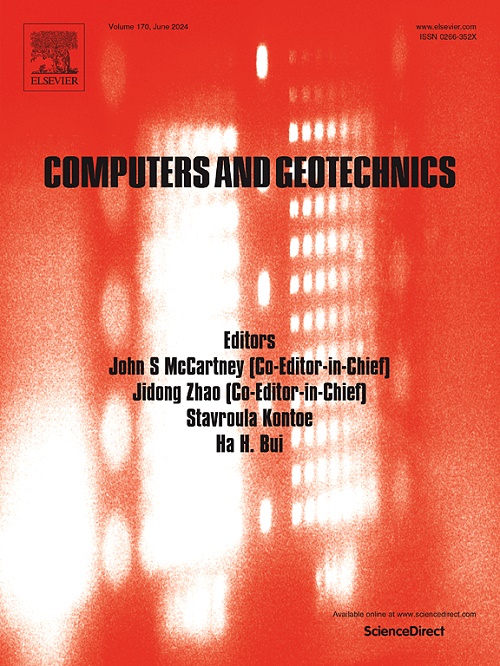A constitutive model of rock based on strain cone surface and the parameter calibration method with high efficiency
IF 5.3
1区 工程技术
Q1 COMPUTER SCIENCE, INTERDISCIPLINARY APPLICATIONS
引用次数: 0
Abstract
The elastic and plastic strains of rock during the compression process cannot be accurately identified by common constitutive models. This paper investigated the strain evolution of rock under monotonic compressive load by referring to results from damage-controlled cyclic loading tests, and discussed the contradiction between the flow rule of traditional elastoplastic constitutive models and real plastic strain development. Therefore, a strain cone surface constitutive model was proposed, where the yield surface was replaced with strain cone surfaces for both elastic and plastic strains. The magnitude and direction of vectors regarding elastic and plastic strain increments occurring on these conical surfaces were explored. Then, the proposed model was validated against cyclic loading tests. Furthermore, a robust parameter calibration method was developed based on genetic algorithm, and its ability to search for optimal parameters was verified by comparing the simulated constitutive relationships with the practical stress–strain curves. The results show that the traditional flow rule could be incompatible with the real plastic strain variation. In contrast, the proposed model could accurately simulate the evolution of elastic and plastic strains, demonstrating high precision and applicability. Moreover, the calibration method enables the determination of model parameters with high accuracy and efficiency.
基于应变锥面的岩石构成模型及高效参数校准方法
岩石在压缩过程中的弹塑性应变无法通过普通的构造模型准确识别。本文参考破坏控制循环加载试验的结果,研究了岩石在单调压缩荷载作用下的应变演化过程,探讨了传统弹塑性构造模型的流动规律与实际塑性应变发展之间的矛盾。因此,提出了一种应变锥面构成模型,即用应变锥面代替屈服面来表示弹性应变和塑性应变。研究了这些锥形表面上出现的弹性和塑性应变增量的矢量大小和方向。然后,根据循环加载试验对所提出的模型进行了验证。此外,还开发了一种基于遗传算法的稳健参数校准方法,并通过比较模拟构成关系和实际应力应变曲线,验证了该方法寻找最佳参数的能力。结果表明,传统的流动规则可能与实际塑性应变变化不相容。相比之下,所提出的模型可以准确模拟弹性应变和塑性应变的演变,显示出较高的精度和适用性。此外,校准方法还能高精度、高效率地确定模型参数。
本文章由计算机程序翻译,如有差异,请以英文原文为准。
求助全文
约1分钟内获得全文
求助全文
来源期刊

Computers and Geotechnics
地学-地球科学综合
CiteScore
9.10
自引率
15.10%
发文量
438
审稿时长
45 days
期刊介绍:
The use of computers is firmly established in geotechnical engineering and continues to grow rapidly in both engineering practice and academe. The development of advanced numerical techniques and constitutive modeling, in conjunction with rapid developments in computer hardware, enables problems to be tackled that were unthinkable even a few years ago. Computers and Geotechnics provides an up-to-date reference for engineers and researchers engaged in computer aided analysis and research in geotechnical engineering. The journal is intended for an expeditious dissemination of advanced computer applications across a broad range of geotechnical topics. Contributions on advances in numerical algorithms, computer implementation of new constitutive models and probabilistic methods are especially encouraged.
 求助内容:
求助内容: 应助结果提醒方式:
应助结果提醒方式:


